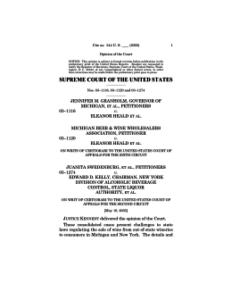 In a previous post we introduced Alex Tanford, the Indiana attorney and professor who played a key role in moving the landmark Granholm v Heald Supreme Court case to fruition and who is currently challenging discriminatory laws in three states that ban retailer to consumer shipping. In this post, Professor Tanford addresses questions concerning the current state of 2st Amendment/Commerce Clause jurisprudence.
In a previous post we introduced Alex Tanford, the Indiana attorney and professor who played a key role in moving the landmark Granholm v Heald Supreme Court case to fruition and who is currently challenging discriminatory laws in three states that ban retailer to consumer shipping. In this post, Professor Tanford addresses questions concerning the current state of 2st Amendment/Commerce Clause jurisprudence.
NAWR: Directly after Repeal of Prohibition, courts tended to rule that state-based discrimination against out of state interests were constitutional and a natural reading of section 2 of the 21st Amendment. The with the Hostetter, Bacchus and finally the Granholm decision, the Court moved toward a more nuanced and balanced understanding of Section 2. Can you speak to how the passage of time may have a predictable impact on how the Court interprets the Constitution in general, but also in how it approaches the 21st Amendment and if you believe we are likely to continue to see a more balanced approach to interpreting it?
Professor Tanford: Obviously, a constitution written over 200 years ago does not directly address life in today’s America. Similarly, the 21st Amendment, which was written at a time when there was no Internet or FedEx and when many states still had dry laws, does not directly address the states’ authority in today’s market. When it comes to deciding how an old constitutional provision applies to a modern situation, reasonable lawyers and judges will differ based on their personal experiences and politics.
The commerce clause stands for the proposition that the United States is a single national market within which commerce must move freely, even if that frustrates local regulatory efforts. The 21st Amendment stands for the principle that states may regulate alcohol in ways they could not regulate other products, even if those regulations interfere with the free flow of commerce. These provisions will always be in tension with each other and — as the Court repeatedly says — will have to be applied to state liquor laws in some kind of balanced way, each in light of the other.
Originally, the 21st Amendment was understood as a temperance measure. In order to get the dry states to vote to repeal Prohibition, the Amendment had to give them the power to prevent their local dry laws from being undermined by cross-border sales. In that context, the Supreme Court said that the Amendment trumped the right of out-of-state sellers to engage in interstate commerce. The enforcement of local prohibition was the core concern of the Amendment, and selling products in a state where they are illegal is not a concern of the commerce clause. The balance favors the states.
But today, there are no states that still have prohibition, and even dry counties are becoming scarce. States have moved from prohibition to local-option to state-wide markets, from a few ABC stores to lots of private licensees, from limited hours and Sunday closings to 24-hour sales in grocery stores. They have authorized farm wineries, microbreweries, craft distillers, and hotel minibars. They have gone from allowing only on-site in-person purchases to telephone orders and home deliveries, to the Internet, FedEx and Drizly. With each expansion of the market that makes alcohol more easily available, the 21st Amendment’s temperance principle becomes less relevant and the commerce clause’s nondiscrimination principle becomes more important, and the balance shifts. A law prohibiting home deliveries altogether would promote temperance, but a law allowing deliveries by local businesses but not those located in other states promotes only economic protection.
It is hard to imagine that our culture is going to suddenly change course, shut down brewpubs, and start demanding that alcohol sales be restricted in order to advance temperance, so the 21st Amendment’s importance will continue to wane. It is hard to imagine that we will suddenly reject home delivery from Amazon and start demanding that all purchases be made locally, so the centrality of Internet ordering and shipping to the core definition of commerce will continue to increase. It is also hard to imagine that businesses will suddenly stop consolidating and creating more efficient multi-state operations. All of this suggests that the states’ protectionist three-tier systems that insulate in-state businesses against competition from Internet sellers and chain stores will be increasingly susceptible to constitutional challenge. I think that’s a good thing. Maybe I’ll finally be able to get a bottle of Terra D’Oro Deaver Vineyard Zinfandel here in Indiana.
NAWR: In most, if not all of your alcohol-related cases, the 2005 Granholm v. Heald Supreme  Court decision has played an important role in making your argument. The non-discrimination principles emphasized by Justice Kennedy have been particularly important. However, do you think there are parts of the Granholm decision that the court got wrong, under-emphasized or over emphasized?
Court decision has played an important role in making your argument. The non-discrimination principles emphasized by Justice Kennedy have been particularly important. However, do you think there are parts of the Granholm decision that the court got wrong, under-emphasized or over emphasized?
Professor Tanford: The emphasis on discrimination is the result of a conscious choice Bob and I made at the beginning. Before you bring a constitutional case, you have to be able to “count to five” because it will ultimately take at least five favorable votes from the Supreme Court to win. We could not identify a fifth Justice who would be willing to overturn a state alcohol law simply because it burdened interstate commerce, gave in-state wholesalers a lucrative monopoly on the wine trade, and put out-of-state sellers at a disadvantage. A majority of Justices seemed to hold the view that the sale of alcohol was a public safety issue to be regulated at the state level. The one Justice we thought might be in play was Antonin Scalia. Although he was a staunch states-rights judge, some of his prior opinions suggested that he might draw a line at state regulations that discriminated in favor of local industry.
So, we went back through state laws restricting interstate wine sales and looked for discrimination. We found it in laws giving economic protection to local wineries to help them survive. These farm wineries were a new phenomenon in the 1990s. They produced small amounts of wine, were often located in rural areas, lacked wholesale distribution, and had trouble getting their product to market through the traditional three-tier system. Many states had passed laws allowing them to self-distribute and to sell directly to the public. A few also allowed them (but not those located out-of-state) to ship wine to consumers, and these were the states against whom we brought the first dozen cases, including Granholm. The strategy was successful, and we won in the Supreme Court 5-4 when Justice Scalia joined in Kennedy’s opinion.
The Court said that the nondiscrimination principle of the commerce clause applied to state liquor laws. States could decide whether or not to allow direct shipping, but had to apply that decision to all wineries. Giving the privilege to local wineries and denying it to their out-of-state competitors was unconstitutional despite the broad authority a state has to regulate alcohol sales. The Twenty-First Amendment protects state laws that burden interstate commerce only if the state treats in-state and out-of-state wineries the same.
Supreme Court cases follow a pattern. They review the history and current status of the constitutional principles at stake and then apply them to the case before them. The Granholm opinion noted that the 21st Amendment originally was thought to give states virtually unlimited authority to regulate alcohol, but has since been interpreted as secondary to other constitutional principles including the nondiscrimination principle of the commerce clause. It then applied this principle to state laws allowing in-state wineries to direct ship, but prohibiting out-of-state wineries from doing so. It ruled that these laws discriminated against interstate commerce and were not necessary to advance the state’s interests in temperance, revenue collection and market control. Most lower courts have followed Granholm and applied the nondiscrimination principle to state liquor regulations that discriminated against producers, wholesalers, distributors, retailers and consumers in a variety of contexts.
The Supreme Court has no power to force lower courts to obey its precedents. There are 400,000 cases each year filed in federal court and 50,000,000 in state courts, and the Supreme Court reviews fewer than 100 of them. It is therefore inevitable that because of lack of understanding by busy judges, poor presentations by lawyers, or political disagreement, some lower courts will reach decisions inconsistent with Supreme Court precedent. This has happened in a few of the lower court wine cases decided since 2005. One court has said that because Granholm applied the nondiscrimination principle to wineries, it only applies to producers and not wholesalers; another has said it does not apply to retailers. One court has said that because Granholm applied the nondiscrimination principle to a law allowing wineries to bypass wholesalers and sell directly to consumers, it only applies if a state creates an exception to the usual three-tier distribution system. A fourth has said that because Granholm said that the 21st Amendment would protect restrictions on shipments by wineries if the state had treated in-state and out-of-state wineries the same, the Amendment also protects other kinds of restrictions as long as the state treats in-state and out-of-state wineries the same — even laws that have nothing to do with wineries.
It would have been useful if the Court had explicitly reminded people that this is not the way Supreme Court cases are usually understood, and that it expects its statement of core constitutional principles to be faithfully applied by lower courts.
 NAWR: Your current retailer wine shipping cases filed in Michigan, Missouri and Illinois are all in one way or another attempts to address facial discrimination against out-of-state wine retailers. Ultimately, what would be the optimum result? What kind of ruling and by whom would you like to see?
NAWR: Your current retailer wine shipping cases filed in Michigan, Missouri and Illinois are all in one way or another attempts to address facial discrimination against out-of-state wine retailers. Ultimately, what would be the optimum result? What kind of ruling and by whom would you like to see?
Professor Tanford: Ultimately, we would like to see the trade barriers that prevent buying wine over the Internet removed. The industry needs to join the 21st century. The system put in place in 1933 serves no one’s interests today except the wholesalers. Retailers, restaurants, importers, wine makers, and consumers are all harmed by the existing bizarre distribution system that raises costs and restricts product distribution. I love the zinfandels from wineries in the Sierra foothills like Perry Creek, Lava Cap, Latcham, and Montevina, but I can’t get them in Indiana. That’s ridiculous in 2017.
But modernizing wine laws is ultimately a job for state legislators, not courts. The courts can say it is unconstitutional to discriminate, but cannot tell a state whether to remedy the discrimination by treating everyone equally well or equally badly. In prior cases involving direct shipping by wineries, some states responded by setting up a licensing and regulation system that allowed out-of-state wineries to make direct shipments, but others responded (at least initially) by taking away the right from local wineries. In the long run, most of those states have eventually opened up their markets. I expect the same thing to happen with direct shipping by retailers. But as they say, this is a marathon, not a sprint, and our litigation is only part of the process of modernizing wine sales.